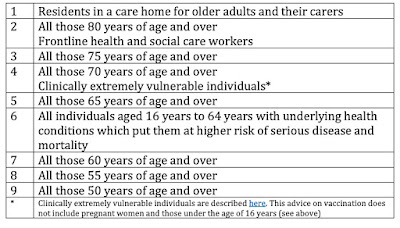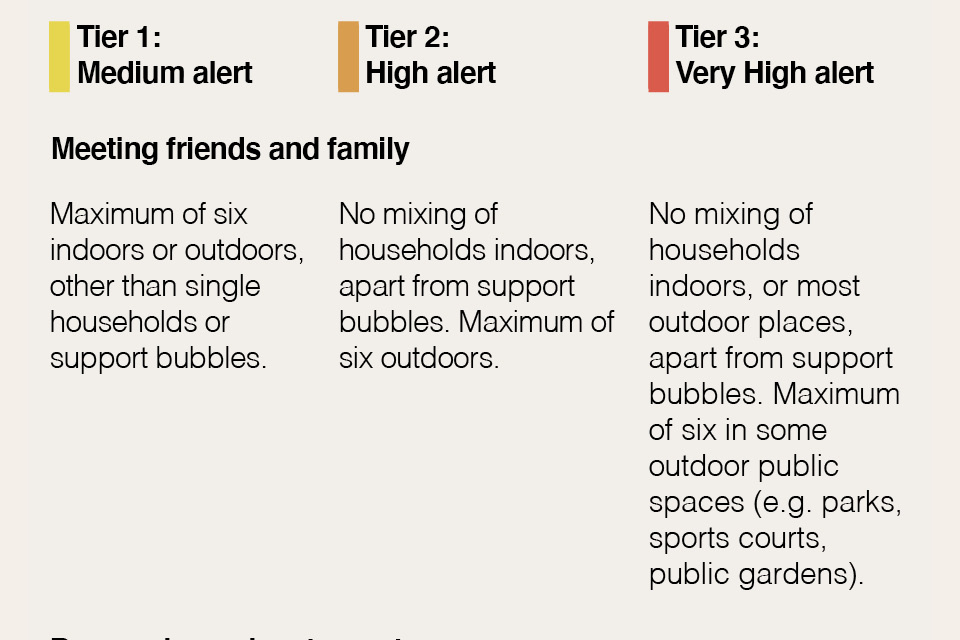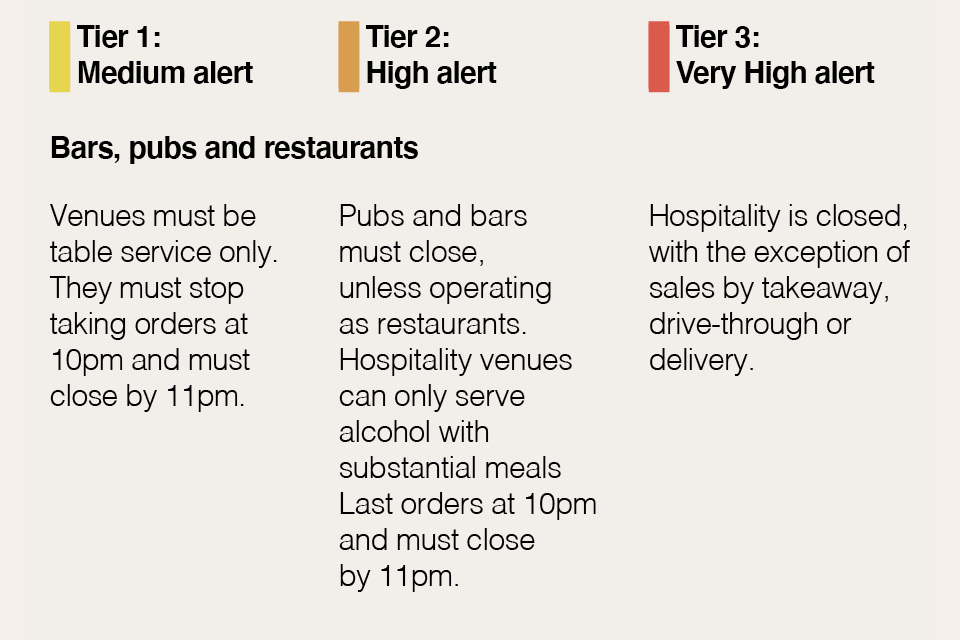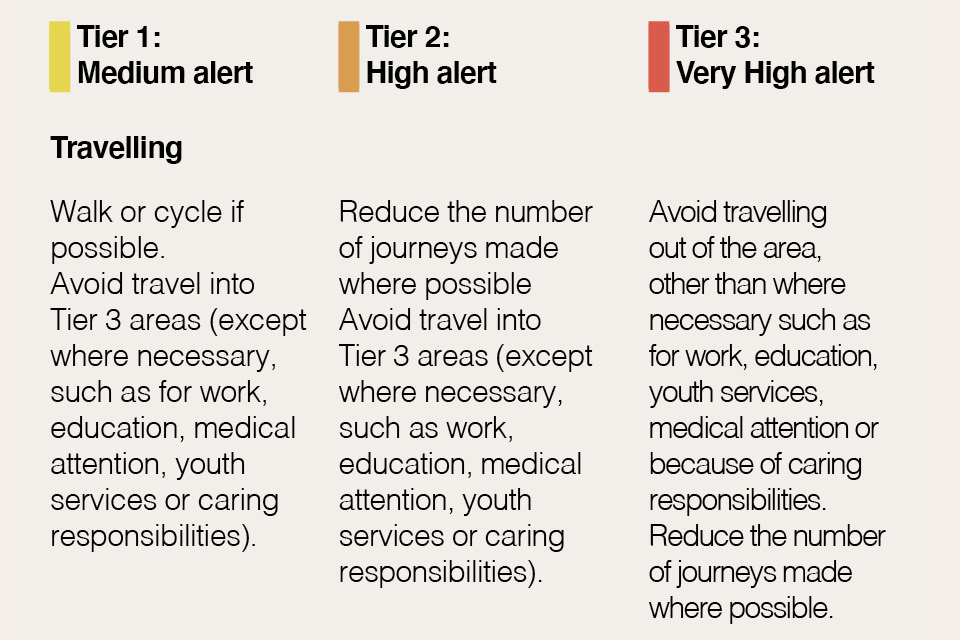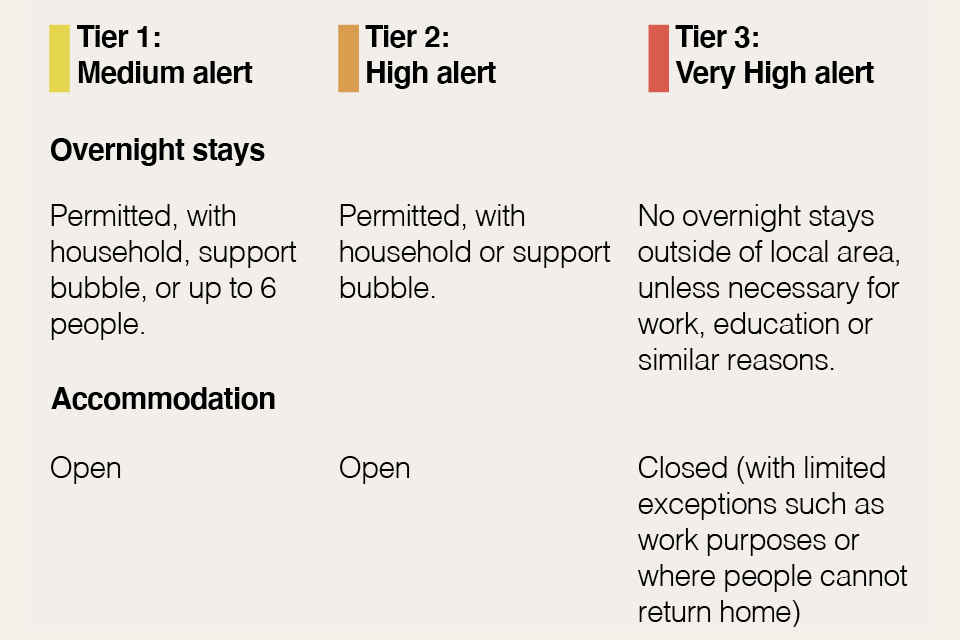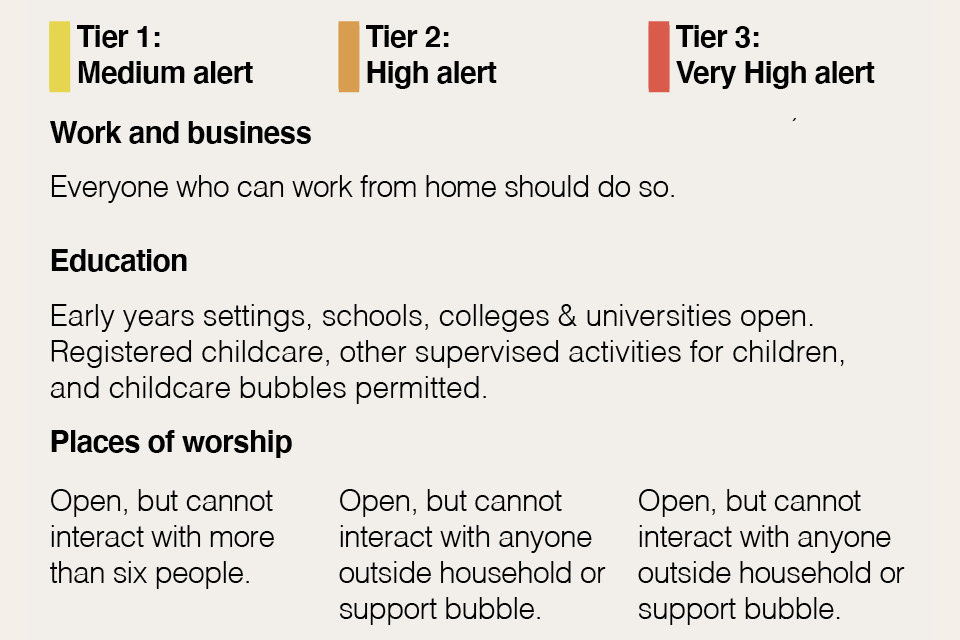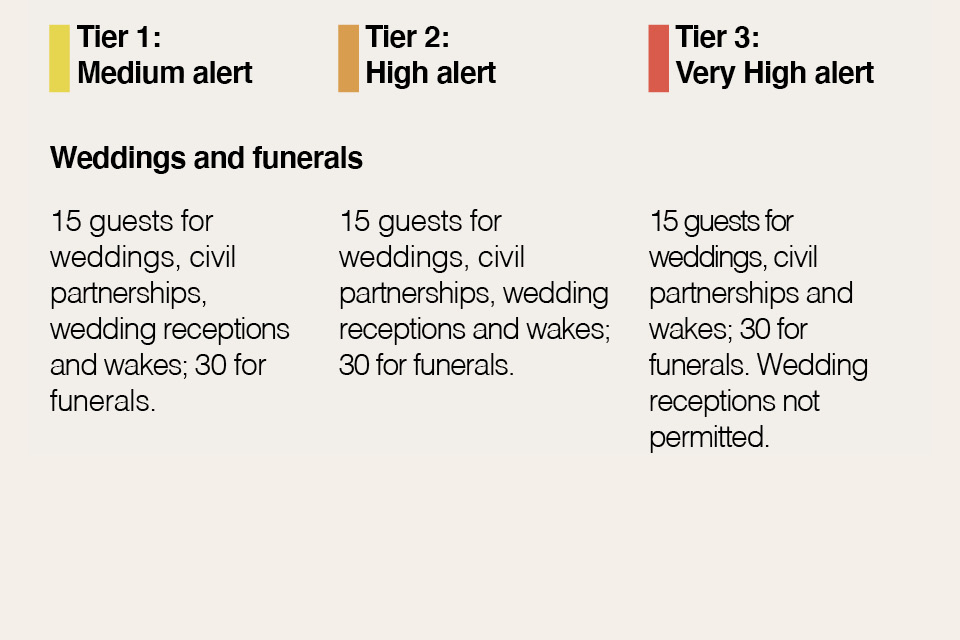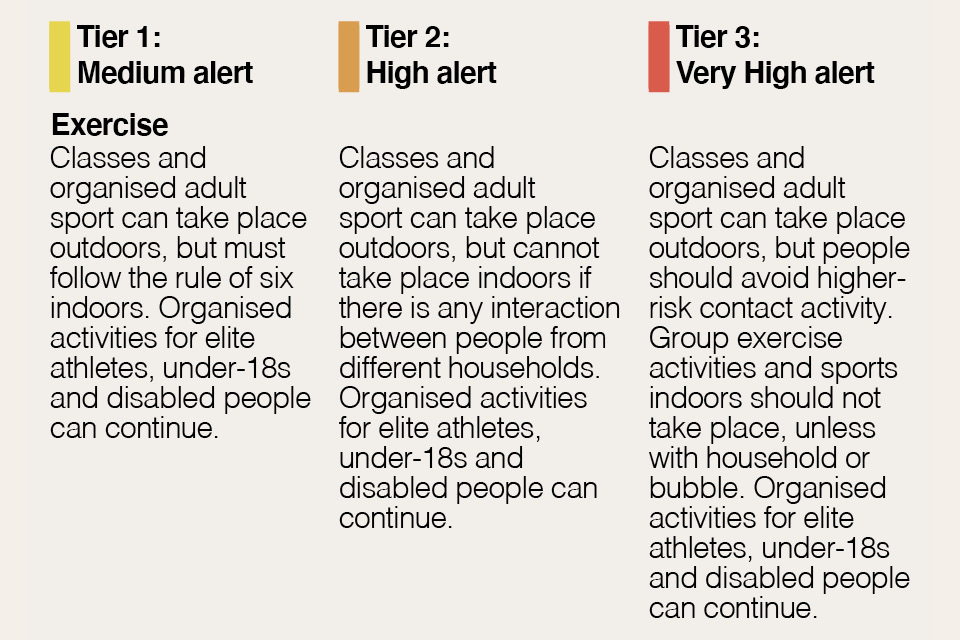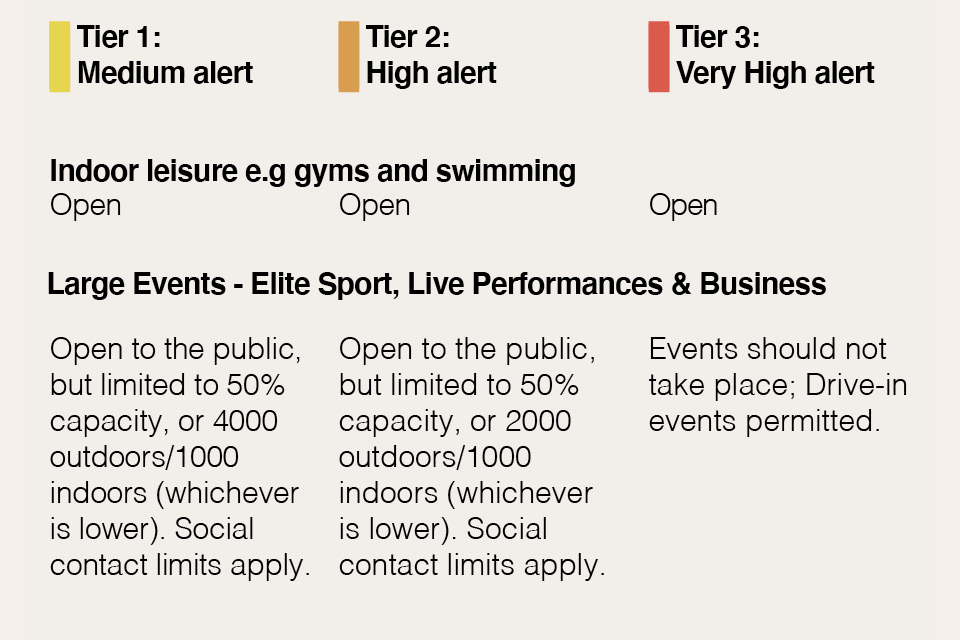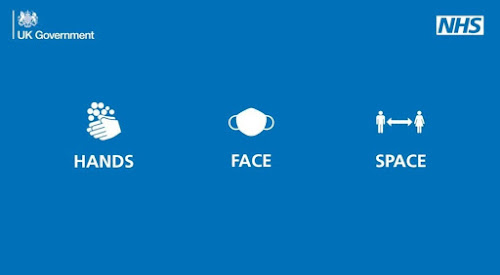Since news emerged yesterday that Northumberland will enter Tier 3 restrictions as we leave National Restrictions, I wanted to take a moment to set out some of the data and explain why this is the case.
Tier 3 is far short of the full National Restrictions we have recently experienced, and means:
- You can leave home for any reason, and meet with up to six people in outdoor public spaces, such as parks, beaches and public gardens.
- All non-essential shops can re-open.
- Indoor leisure – such as gyms – can re-open.
- Personal care – including the hair and beauty sector – can re-open.
- Places of worship can re-open.
However, as a result of our increased infection rates in Northumberland, there are a number of additional restrictions in place, and some businesses will be unfortunately unable to re-open at this time.
- Pubs, bars and restaurants will remain closed, with the exception of for takeaway and delivery.
- Group activities cannot take place in indoor leisure.
- Hotels and self-catered accommodation will remain closed, except for those travelling for work.
- Wedding receptions cannot take place, though weddings are permitted.
- Indoor entertainment venues will remain closed.
I know how tough this is going to be – especially for the hospitality industry. We have already faced additional restrictions in Northumberland since the middle of September, and nobody wanted to see these restrictions last this long.
Infection rates in Northumberland and the Tyne Valley
Over the last few days, many people have asked me why we are being ‘lumped in’ with Newcastle, and other urban areas such as Gateshead. Many people have also told me that cases in Northumberland are lower than elsewhere, or that it is cases in Blyth and Ashington are dragging us into Tier 3.
Across the County, our cases per 100,000 sit at 189.8. A significant number of wards within the Hexham Constituency have higher or similar rates to this, as you can see from the chart below.
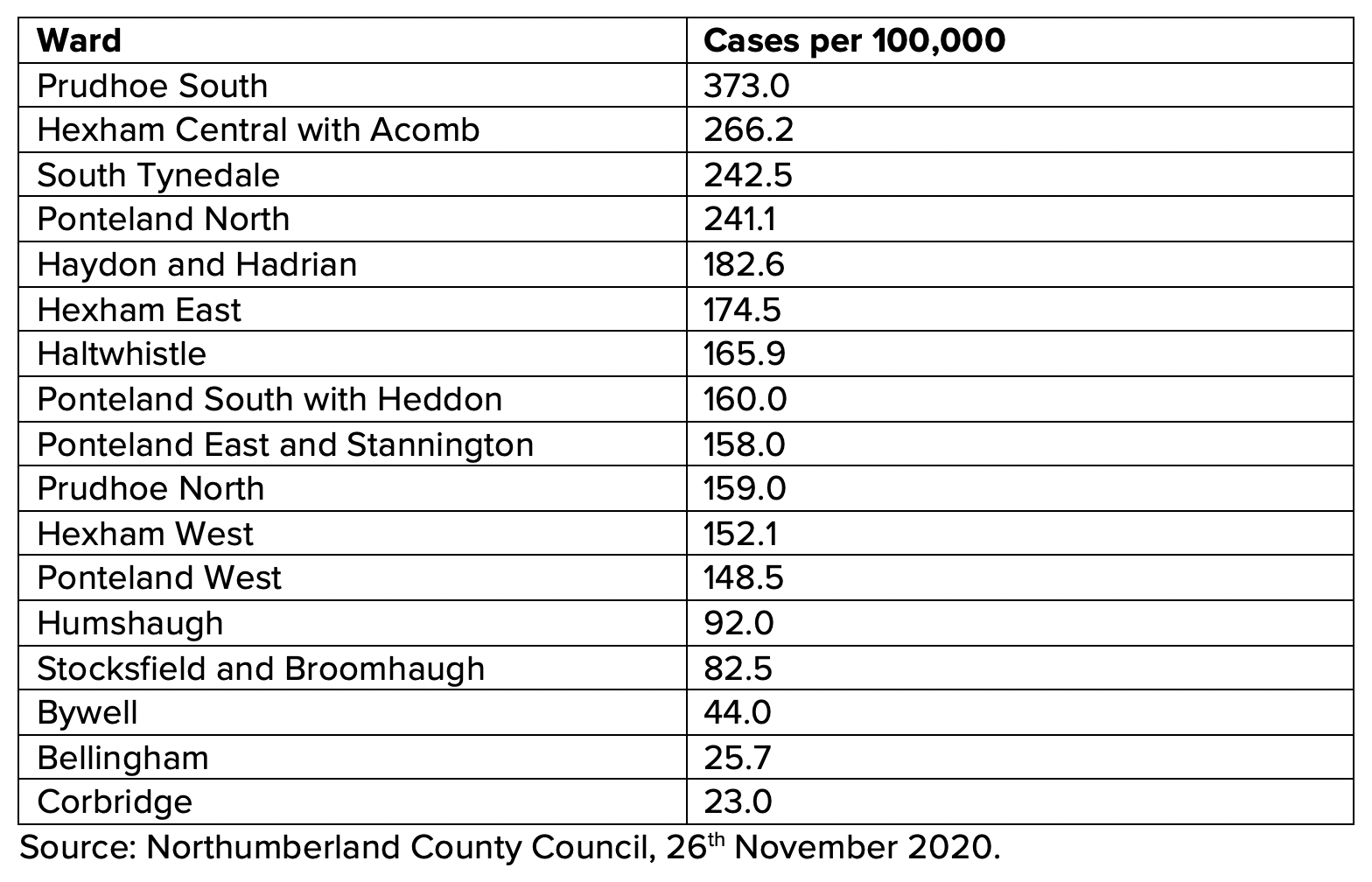
Although infection rates have fallen in recent days, we do have to face the fact that cases in Northumberland continue to be extremely high. The sad reality is that Northumberland would be in Tier 3 on its own infection rates, and rates in much of the Tyne Valley are similar to the rest of Northumberland.
Some have argued they would like to see specific wards removed from the restrictions. This would, however, be unworkable. We all travel across the Tyne Valley on a regular basis for shopping, education, work – and indeed, to socialise. There would be little to stop somebody from a high infection area (where pubs would be closed), visiting pubs in a low infection area (where they would be open).
This would be unfair on local residents and would simply not work. We could not put additional restrictions in place in Prudhoe, but not Wylam, for example.
Clearly if there was to be a massive, sustained difference between rural and urban areas, and it is workable, we may be able to take a super-localised approach. However, when this was tried in Nottinghamshire, it simply did not work. We are all looking at finding a way to get out of Tier 3, but most of all this relies upon people looking after themselves.
The World Health Organisation assesses that once cases hit more than 50 per 100,000, action needs to be taken. Over 80% of wards in the Hexham Constituency have case rates higher than this.
In addition, during the summer, travellers returning from countries with a positivity rate of more than 20 cases per 100,000 were required to self-isolate on arrival. All parts of the Hexham Constituency now have rates higher than this.
Hospital Capacity
When taking decisions about which Tier to place local areas in, infection rates are not the only measure used. Hospital capacity is also crucial.
Our Northumberland hospitals in Hexham and Haltwhistle are doing a great job. However, the most seriously ill patients require care the Northumbria NHS Trust's hospital in Cramlington. That is why it is important to look at the county-wide picture.
The NHS cannot become a National Covid Service. It has to be able to treat others too. From heart attacks, to cancer patients. Every critical care bed occupied by a COVID patient is another bed that cannot be used to treat others. By keeping our COVID numbers down, we can ensure those beds are there for others.
Support to protect people’s jobs, businesses and incomes.
As we are in Tier 3 restrictions, businesses will be eligible for additional financial support. Business properties forced to close will be eligible for cash grants of up to £3,000 per month based on their rateable value. Businesses adversely affected (such as B&B’s and hotels) will also be eligible for support.
The Furlough scheme will remain open until end the of March, paying 80% of people’s wages, up to £2,500 per month. A third grant for those who are self-employed will also open for applications from Monday.
Details of the all the financial support packages is available
here.
How can we get out of Tier 3?
The question now is how can we get out of Tier 3 restrictions.
Infections are falling across Northumberland, and indeed across the country. The Tiered system will be reviewed every two weeks, with the first review taking place on December 16th.
I want us to return to Tier 2, but, put simply, that cannot happen unless our numbers fall. So we all need to play our part and follow the rules.
The future
There are reasons to be optimistic. Our cases in Northumberland have fallen by almost 20% in the last week. As a Tier 3 area, we will also now be eligible for mass Coronavirus testing.
This means that very soon, everybody locally will be tested, even if they don’t have coronavirus symptoms. This mass testing follows a successful trial in Liverpool, which has seen case numbers fall by 75% in the city. It is my hope that this scheme will be rolled out in the coming weeks.
There have been medical advancements too. From drugs like Dexamethasone – discovered by UK experts, to antibody cocktails – which begin clinical trials this weekend – which aim to protect those who may be unable to be given vaccines. We have three strong vaccine candidates in the pipeline – including a huge breakthrough this week from Oxford University - with a real potential for the first vaccinations to take place before the end of the year.
We will get through this, but we all need to work together. Remember the basics. Wash your hands, cover your face in enclosed spaces, and keep apart from others. And if you have symptoms, self-isolate immediately and get a test. The more we follow the rules, the quicker we can return to normal.
SupportAs ever, my small team of staff and I are here to help you in any way we can. My coronavirus website contains the latest information and support for businesses. I’ve included some useful links below.
Coronavirus LatestGetting testedFinancial supportForeign travel








